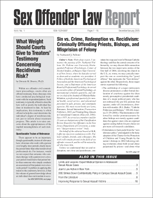Therapeutic Jurisprudence and Sex Offender Policies, Part II
Author: Leonore M.J. Simon, J.D., Ph.D..; Kristen Zgoba, Ph.D..
Source: Volume 06, Number 06, October/November 2005 , pp.81-83(3)

< previous article |next article > |return to table of contents
Abstract:
Editor’s Note: Crimes carried out by convicted sex offenders continue to occur despite numerous laws and policies intended to incapacitate such individuals. In fact, the article below argues that such policies can have antitherapeutic consequences for victims by raising public expectations. According to the authors’ argument in part one of this series, the best intentions of legislators to protect children from molesters can fail. Parents’ reliance on policies may increase the probability of victimization. For one thing, public policies often fail to acknowledge the risk of abuse by family members and those known to the family. Also, reliance on public policy initiatives cannot replace individual awareness and vigilance. The existence of the policies may cause parents to worry less about their children’s safety and cause them to devise fewer protective strategies for their children.The authors, therefore, suggest a therapeutic jurisprudence analysis to explore the benefits and liabilities of sex offender policies for children and their families.Keywords:
Affiliations:
1: East Tennessee State University; 2: New Jersey Department of Corrections.